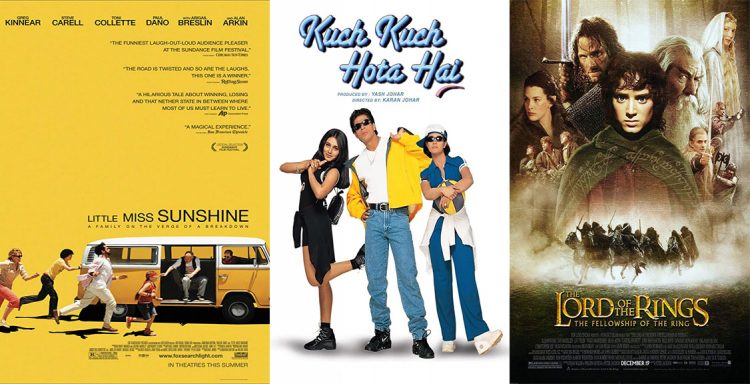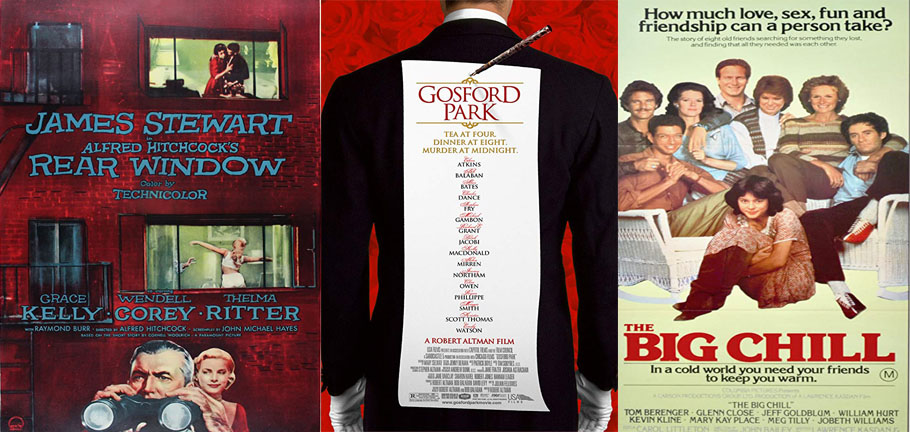Whether you’re practicing social distancing, in self-quarantine or going about your business as normal, it’s hard to ignore that the current times are a bit fraught. Our current worries about the slate of socio-political issues have been supplanted by coronavirus panic. Schools and some workplaces have temporarily closed, and new releases have been postponed at cinemas, providing many with lots of time on their hands. What better to do than to turn to art?
It’s times like these that remind us the value of artistic work and film is always there to lend support. So, in lieu of a traditional review – here are some recommendations to turn to for comfort and commiseration in these times of crisis.
Rear Window – 1954, dir. Alfred Hitchcock
Hitchcock’s 1954 thriller focuses on a bedridden photographer who witnesses a murder in the apartment across from his. Or, does he? We’re not sure; and, finding out is half the fun in this note-perfect classic. Every part of this film is perfect, from James Stewart’s dogged certainty, Grace Kelly’s easy splendour, Thelma Ritter’s harried humour and the film’s surety that drama and intrigue can occur even when one is confined to an apartment. “Rear Window” is as good a sign as any that physical isolation does not necessarily have an impact on quality of experiences.

Gosford Park – 2001, dir. Robert Altman
In the vein of films set in one place, and murder, Robert Altman’s atypical murder mystery is another good recommendation. No, it’s not that murder is an ideal distraction during the current crisis but the incredibly enjoyable “Gosford Park” is so delightful you’re apt to forget that a murder is its central focus – even the film does. Long before the days of “Downton Abbey” fame, Julian Fellowes was writing sharper stuff and this ensemble comedy about the lives of the rich and their employees in 1930s England is scathing, charming, ridiculous and irresistible. The class struggles of a pre-war England filled with selfish but compelling characters offers a welcome distraction from our own contemporary foibles.
The Big Chill – 1983, dir. Lawrence Kasdan
If you’d prefer that your group of disparate people hang out in a film that is not dependent on murder, you could do a little worse than the easy charm of “The Big Chill”. True, the crisis that brings these former college friends together is the suicide of one of their own but beyond that sombre opening (with a nifty organ rendition of “You Can’t Get What You Want”), “The Big Chill” is a sweet and moving reunion film featuring a group of friends trying to see if they still fit together. It’s a classic eighties hangout movie and it also boasts the best movie soundtrack of the 1980s, with Aretha Franklin, Smokey Robinson, Marvin Gaye and The Temptations as proof.
Claudine – 1974, dir. John Berry
Hope out of tragedy is likely a comforting theme during this time and the excellent “Claudine” is a welcome, albeit unorthodox, reminder of that. The bare-bones of the film are not immediately hopeful – Claudine is a single mother in Harlem living on welfare with her six children and her romance with a garbage collector is interrupted by poverty and her children’s displeasure. Still, if it’s charm that you’re in search of, Diahann Carroll’s resplendent turn as Claudine is unindictable. It’s one of the decade’s best performances and it’s a story of resilient hope in the face of classism and racism that’s hard to knock. This underseen gem is a great mark of black cinema.
Sounder – 1972, dir. Martin Ritt
If you prefer your stories of a family to be a little warmer, then look to “Sounder” from two years earlier. This one might be an even bigger hit with the family as it tells the tale of a family of black sharecroppers who depend on their dog Sounder for support when the family’s patriarch is wrongfully jailed. It is set in 1930s America, so racism is especially rampant but the film’s representation is vital and moving. Cicely Tyson is perfection as the matriarch of the family, but this is a true ensemble film with some ace child performances (Kevin Hooks in particular), a moving Paul Winfield as the stoic father, and a charming dog.
Little Miss Sunshine – 2006, dir. Jonathan Dayton and Valerie Faris
If you are practicing social distancing at home with family, then stories of trenchant families probably work best so follow-up the historical perspective in “Sounder” with the more recent “Little Miss Sunshine” – another tale of a family making the best of an unlikely situation. This tale of young Olive’s journey to win a beauty pageant has small stakes that turn into giant themes in an ensemble that’s good all-round. The genuine joyfulness in the wake of sadness that carries the film is infectious (in a good way!) and feels as timely and needed as ever, with a final act dance-sequence that will lift your spirits, even if momentarily.
Dancehall Queen – 1997, dir. Rick Elgood and Don Letts
Family struggles are a little more unorthodox in this Jamaican classic but “Dancehall” Queen feels like exactly the kind of film you’d want to watch in a crisis. From the stellar soundtrack of nineties music, to Audrey Reid’s superlative performance as a roadside vendor who ventures into the world of the dancehall this is a genuinely fun and funny film that’s thoughtful enough to grapple with difficult themes – poverty, exploitation, drugs, sexism. Also, who can resist a movie with a Beenie Man and Lady Saw appearance at the end?
Nashville – 1975, dir. Robert Altman
Keeping our musical sensibilities alive, and including another Robert Altman piece on the list, harken back to the 1970s for “Nashville” – the best ensemble film of all time? Yes. If you’re at home for a while it’s as good a time as any to hop into the longer films and Nashville a long and rewarding enterprise. The good thing about ensemble films is that there’s bound to be something to grab your attention, but truly everything about “Nashville” is excellent – even if you’re sceptical about country music, the entire film’s subversive indictment of Americana is intriguing and by the time the film descends into chaos as a crowd of jittery people sing ‘It Don’t Worry Me’ after a tragic event, “Nashville” might feel more apt than expected.
Kuch Kuch Hota Hai – 1998, dir. Karan Johar
If you prefer your music less country-western and more South Asian, it’s hard to beat the gloriously indulgent romance of “Kuch Kuch Hota Hai”. Although the better Shah Rukh Khan film that year is the glorious and gloriously depressing thriller “Dil Se”, Kuch Kuch is a better option for comfort viewing – not just because of its welcome happy ending but it’s tale of love found, and lost, and found again is welcome saga that’s fantastical enough to be comforting but steeped in enough realism to be encouraging. Also, its soundtrack is hard to argue against. Its three hours will fly by while you’re practicing social distancing.
The Lord of the Rings Trilogy – 2001-2003, dir. Peter Jackson
What’s longer than a Bollywood romantic fable? A trilogy. There’s something especially comforting about descending into complete fantasy and fantasy films rarely come better than “The Lord of the Rings”. There’s something here for everyone – a laborious quest, thrilling battle sequences, dizzying magic, moving romance and world-changing friendships. Two decades after it began shooting Peter Jackson’s fantasy world still feels fresh and essential and if you’re in want of something to keep your attention for a sustained period, then a marathon of this trilogy is bound to be satisfying.
Atlantics – 2019, dir. Mati Diop
I’ve written at length about the excellence of “Atlantics”, and if you’d prefer your fantasy a bit more grounded in reality this Netflix entry – and one of the best films of the last year – is an essential. Diop’s tale of a young girl’s journey to coming-of-age set against the social upheaval of a changing Senegal is a tender tale of womanhood that uses magical realism and a foreboding score to craft a tale of true excellence.
Bonus – TV
If TV shows are more your interest, the best TV show to watch over the period is the whimsical dollop of perfection that is “Pushing Daisies”. The too-brief two season show is still one of the most expert experiments in whimsical comedy this century that feels ironically relevant – a piemaker who can raise folks from the dead with a touch. But this isn’t macabre – instead it’s colourful, inspiring and sweet without being treacly. Lee Pace, Anna Friel, Chi McBride, Swoosie Kurtz, Ellen Greene and a scene-stealing Kristin Chenoweth make up the cast and each episode is a welcome offering of sweetness and warmth. For something truly comforting, any episode of this rewarding show would prove apt. I wouldn’t judge you if binge all 22 episodes in one weekend. In fact, I’d recommend it. You could even watch it out of sync and start with the delightful second season episode aptly titled, “Comfort Food”.











